Laws compelling extractive companies to report their payments to governments at the project level have been adopted in the EU, the US, Canada and Norway. The EITI has agreed to roll out project-level reporting across all 51 of its implementing countries. Early adoption of the regulations in the UK, France and Norway resulted in dozens of companies reporting in 2014 and 2015, with thousands more set to publish reports in the coming years.
A key aim of payment transparency is to deter governments and companies from misusing revenues from natural resource extraction in the first instance. However, it was also recognised that it will be possible to pro-actively use the data disclosures to hold actors to account for questionable transactions after they have taken place, which in turn should work to strengthen the regulations’ deterrent effect. Analysing project-level data can be relatively straightforward, but in many cases it is complex and technical. As such, as part of the PWYP Data Extractors’ programme, work was done to produce an accessible handbook for using project-level payment disclosures for accountability purposes.
This case study is part of Publish What You Pay’s Data Extractors programme, a global initiative which trains PWYP members and activists from across our network to use extractives data.











